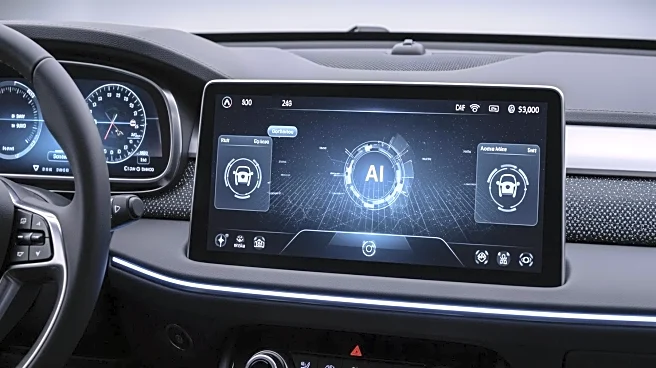What's Happening?
General Motors (GM) has unveiled plans to introduce a range of new technologies in its vehicles by 2028. These include an in-vehicle artificial intelligence assistant developed in collaboration with Google
and a driver-assistance system that allows for hands-free, eyes-off driving. The announcements were made during the 'GM Forward' software event, where CEO Mary Barra emphasized the company's commitment to transforming vehicles into intelligent assistants. The new AI system, known as Google Gemini, is set to launch in GM vehicles next year, while the advanced driver-assistance system will debut in the Cadillac Escalade IQ in 2028. GM is also developing a new centralized computing platform and plans to expand its use of collaborative robots.
Why It's Important?
The introduction of these technologies marks a significant step in GM's strategy to enhance vehicle intelligence and autonomy. By integrating AI and advanced driver-assistance systems, GM aims to improve safety and provide drivers with more convenience, potentially setting a new standard in the automotive industry. This move could strengthen GM's competitive position in the market, especially as other automakers also invest in similar technologies. The focus on AI and automation reflects broader industry trends towards smarter, more connected vehicles, which could lead to increased consumer demand and new revenue streams for GM.
What's Next?
GM plans to begin rolling out the Google Gemini AI system in select vehicles starting next year, with the full implementation of the driver-assistance system expected by 2028. The company will continue to develop its own AI technologies and expand its product offerings in the coming years. As these technologies are introduced, GM will likely face scrutiny regarding their safety and effectiveness, prompting potential regulatory reviews. The success of these initiatives could influence GM's future revenue growth and its ability to meet evolving consumer expectations.
Beyond the Headlines
The development of AI and driver-assistance technologies raises important ethical and legal questions, particularly concerning data privacy and the responsibility of autonomous systems in the event of accidents. As GM and other automakers advance these technologies, they will need to address these concerns to gain public trust and ensure compliance with regulatory standards. Additionally, the shift towards more automated vehicles could have long-term implications for employment in the automotive industry, as the demand for traditional driving skills may decrease.










